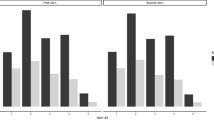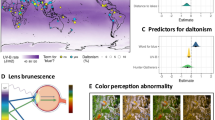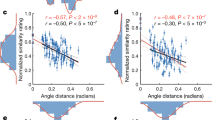Abstract
IT has been known for many years that some individuals are unable to smell hydrogen cyanide, and the possibility that this inability may be genetically controlled was mentioned at a recent conference on the origin and evolution of man1. A short time ago our attention was directed again to this phenomenon, and we have since used a simple method of ascertaining the frequency of the inability to smell hydrogen cyanide among the white population of Australia and carried out a preliminary study of the mode of inheritance of this character.
This is a preview of subscription content, access via your institution
Access options
Subscribe to this journal
Receive 51 print issues and online access
$199.00 per year
only $3.90 per issue
Buy this article
- Purchase on Springer Link
- Instant access to full article PDF
Prices may be subject to local taxes which are calculated during checkout
Similar content being viewed by others
References
Mourant, A. E., Cold Spring Harbor Symp. Quant. Biol., 15, 242 (1950).
Snyder, L. H., Genetics, 19, 1 (1934).
Author information
Authors and Affiliations
Rights and permissions
About this article
Cite this article
KIRK, R., STENHOUSE, N. Ability to smell Solutions of Potassium Cyanide. Nature 171, 698–699 (1953). https://doi.org/10.1038/171698b0
Issue Date:
DOI: https://doi.org/10.1038/171698b0
This article is cited by
-
Spezifische Anosmie als Prinzip olfaktorischer Wahrnehmung
HNO (2016)
-
Odour-Blindness to Musk: Simple Recessive Inheritance
Nature (1973)
-
Studies on the sense of smell to ketone compounds in a Hungarian population
Human Genetics (1970)
-
Specific Anosmia: a Clue to the Olfactory Code
Nature (1967)
-
No Simple Pattern of Inheritance in Ability to smell Solutions of Cyanide
Nature (1967)
Comments
By submitting a comment you agree to abide by our Terms and Community Guidelines. If you find something abusive or that does not comply with our terms or guidelines please flag it as inappropriate.



